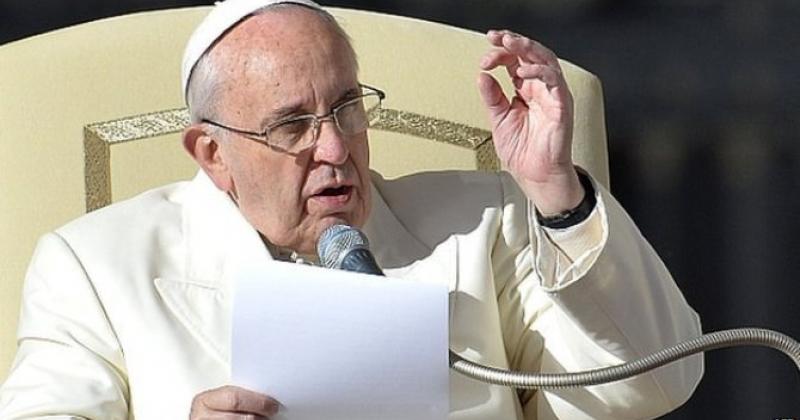Ahead of Sunday’s Mass at Saint Peter’s in commemoration of the centenary of the genocide, the Pope meets with members of the Armenian Catholic Church on April 9, 2015: reconciliation between nations that still have not come to a reasonable consensus on the reading of those events.
Pope Francis remembers the “massacre of the Armenians” at the hands of the Ottoman government one hundred years ago at a meeting with the Patriarchal Synod of the Armenian Catholic Church, in Rome this week to attend the Solemn Mass that the pontiff will preside over this Sunday in Saint Peter’s, in commemoration of the centenary of the genocide. Without using the actual term “genocide”, which is disputed in Turkey, Jorge Mario Bergoglio, in clear reference to Erevan and Ankara, called for “concrete gestures of reconciliation and peace between the nations that still fail to reach a reasonable consensus on the reading of such sorrowful events”, while referring to “darker forces” that can awaken in the heart of man and are “capable of leading us to plan the systematic annihilation of our brothers”.
“I greet you as brothers and thank you for this meeting ahead of Sunday’s celebration at the Vatican Basilica”, said the Pope. “We will offer prayer in suffrage for the sons and daughters of your beloved people, who were victims one hundred years ago. We will pray that Divine Mercy might help us all, in the love for truth and justice, to heal every wound and to hasten concrete gestures of reconciliation and peace among the nations that have not yet reached a consensus on the reading of such sorrowful events”. Expected at Sunday’s mass are two hundred Armenian Catholics, Karekine II and Aram I, as well as the President of Armenia, Serzh Sargsyan, who in a recent meeting with the Pope had invited Jorge Mario Bergoglio to visit Armenia.
“Your people, who are traditionally recognised as the first to convert to Christianity in 301, have a two-thousand-year history and uphold an admirable patrimony of spirituality and culture alongside an ability to pick themselves up after the many persecutions and difficulties they have faced. I invite you to always cultivate a feeling of gratitude to the Lord, for having been able to maintain your loyalty to Him even in the most difficult of times. It is important, also, to ask God for the gift of wisdom of the heart: the commemoration of the victims of one hundred years ago brings us before the darkness of mysterium iniquitatis. We cannot understand”, he underlined, “other than by behaving in this way. As the Gospel says, from deep in the heart, the darkest forces may arise, capable of leading us to plan the systematic annihilation of our brothers, to consider them enemies, adversaries, or even individuals without human dignity. But for believers, the question of evil committed by man also introduces the mystery of the participation in the Redemptive Passion: many sons and daughters of the Armenian nation were able to pronounce the name of Christ until they bled or died of starvation in the interminable exodus forced upon them. The pages of suffering in the history of your people are still being written, in a certain sense, the passion of Jesus, but on each of these lies the seed of his resurrection. It falls to you too, pastors, to teach the laic believers to read reality with new eyes, so that they can say each day: my people are not just sufferers for Christ, but have risen again in Him.” For this reason, said the Pope, “it is important to remember the past, but also to take from it new lifeblood to nourish the present with the joyous word of the Gospel and with the testimony of charity.”
“Our thought of thanks,” the Pope underlined, “in this moment goes to those who are taking action to find some relief from the pains of your ancestors. I think especially of Pope Benedict XV who appealed to Sultan Mehmed V to stop the massacre of the Armenians. This Pope was a great friend of the Christian East: he instituted the Congregation for the Oriental Churches and the Oriental Pontifical Institute, and in 1920 proclaimed Ephrem the Syrian a Doctor of the Church. I am delighted that we are able to meet just before the similar gesture that I will have the honour of making on Sunday with the great figure of St. Gregory of Narek. I especially entrust to him the ecumenical dialogue between the Armenian Catholic Church and the Armeinian Apostolic Church, mindful of the fact that one hundred years ago, like today, martyrdom and persecution have already produced an “ecumenism of blood.” The Pope also expressed his sadness for regions such as Aleppo – “the Bishop said to me: the city of martyrs” – “which one hundred years ago were safe havens for the few survivors”, while “in recent times the safety of all Christians there is at risk, not just Armenians.”
